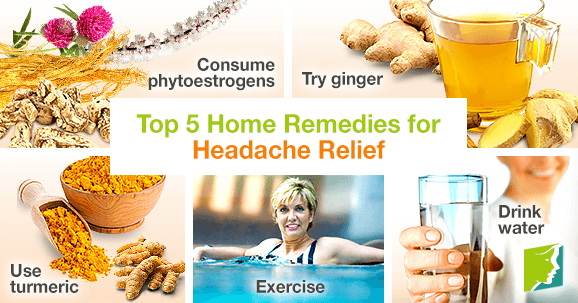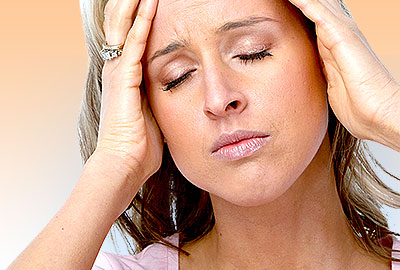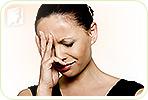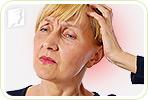Headaches can occur at any time, but perimenopause causes you to be more susceptible to regular and recurrent aches, usually felt in the temples or at the base of the skull. This is primarily due to the hormonal changes that occur during menopause; fluctuations in estrogen and progesterone levels can cause blood vessels to expand and contract, and in the brain, this sometimes blocks nerve pathways and causes headaches to occur. Finding headache relief can be tough, but these home remedies could help.
Consume Phytoestrogens
As a phytoestrogenic herb, black cohosh can greatly contribute to restore estrogen levels, and thus relieve hormone headaches during menopause. Phytoestrogens are plant compounds that mimic estrogen activity in the body. The herb is also anti-inflammatory, which means it could also help with pain management during a headache. Dong quai, ginseng, and red clover are also herbs with estrogenic activity. Drinking infusions of these can reduce the occurrence and intensity of headaches over time.
Try Ginger
Ginger is the go-to herb for natural headache relief. The herb can alleviate pain in two ways: its active ingredients block the formation of inflammatory compounds leukotriene, which some over the counter drugs do, but it also blocks the compound prostaglandin. This twofold functioning renders ginger superior to non-steroidal anti-inflammatory drugs like ibuprofen. During a headache, make a medicinal poultice by boiling chopped ginger root, wrapping it in cloth, and applying it to the site of pain. Alternatively, drinking ginger tea might help relieve pain.
Use Turmeric
A 2009 study of turmeric in the Journal of Alternative and Complementary Medicine discovered it was as effective as ibuprofen for relieving pain. Its anti-inflammatory properties come from the compound curcumin, though the spicy nature of this herb - which is more commonly used blended into curry powder - means that consuming it as a supplement may be the most effective way to experience its medicinal effects.
Exercise
Aerobic exercise is an effective way to combat headaches because it alleviates stress-related headache symptoms, such as muscle tension and anxiety. Exercising for 30 minutes a day at a fairly high intensity - such as running, swimming, or cycling - five days a week can significantly reduce the occurrence and intensity of headaches on a short and long-term basis.
Drink Water
Headaches can be triggered or exacerbated by dehydration. The recommended amount for fluid consumption for women is 1.6 liters per day, which equates to around eight 200-mL glasses. Though any beverage can count toward this, water is a great choice for the weight-conscious, as it does not contain calories or fat. Keep in mind, however, that many foods contain water as well, especially fresh fruits and vegetables.
Using specific remedies for headache relief will go a long way in relieving them, but avoiding triggers, such as bright lights and loud environments, may prevent them from occurring in the first place. If you notice headaches occurring with increasing intensity and regularity, consult with a doctor to rule out any serious health concerns.
Sources
- Andersen, L.L. (2011). Effect of brief daily exercise on headache among adults--secondary analysis of a randomized controlled trial. Scandinavian journal of work, environment & health, 37(6), 547-550. doi: 10.5271/sjweh.3170
- Better Health Channel. (2014). Headaches and Hormones. Retrieved May 29, 2014, from http://www.betterhealth.vic.gov.au/bhcv2/bhcarticles.nsf/pages/Headache_and_hormones
- Grzanna, R. , Lindmark, L. & Frondoza, C.G. (2005). Ginger--an herbal medicinal product with broad anti-inflammatory actions. Journal of medicinal food, 8(2), 125-132. Retrieved from http://www.ncbi.nlm.nih.gov/pubmed/16117603
- Kuptniratsaikul, V. et al. (2009). Efficacy and safety of Curcuma domestica extracts in patients with knee osteoarthritis. Journal of Alternative and Complementary Medicine, 15(8), 891-897. doi: 10.1089/acm.2008.0186
- National Health Service UK. (2013). Headaches. Retrieved May 29, 2014, from http://www.nhs.uk/conditions/Headache/Pages/Introduction.aspx
- National Institutes of Health. (2014). Ginger. Retrieved May 29, 2014, from http://www.nlm.nih.gov/medlineplus/druginfo/natural/961.html
- NYU Langone Medical Center. (2014). Phytoestrogens. Retrieved May 29, 2014, from http://www.med.nyu.edu/content?ChunkIID=108298
- Office of Dietary Supplements. (2008). Black Cohosh. Retrieved May 29, 2014, from http://ods.od.nih.gov/factsheets/BlackCohosh-HealthProfessional/




